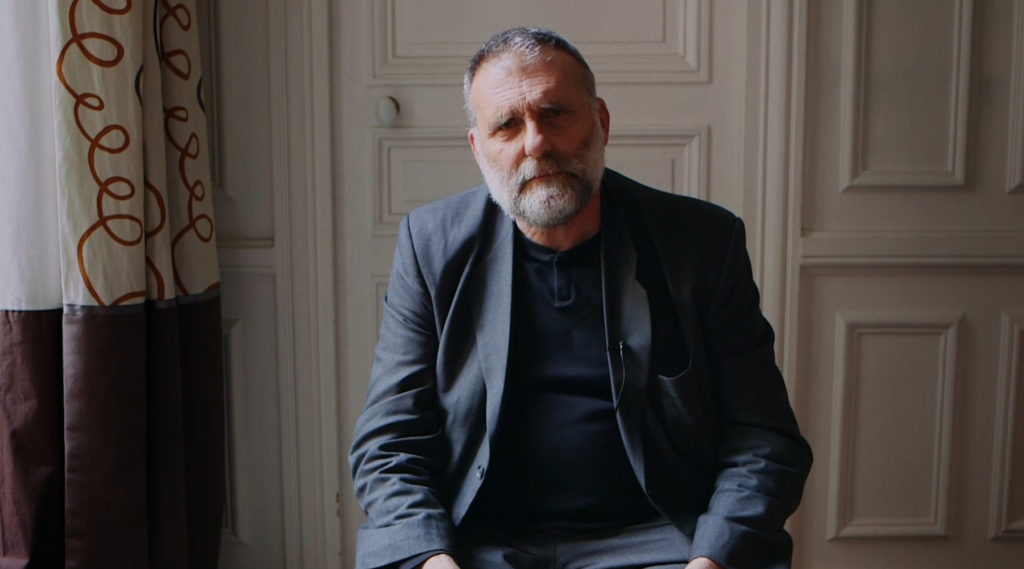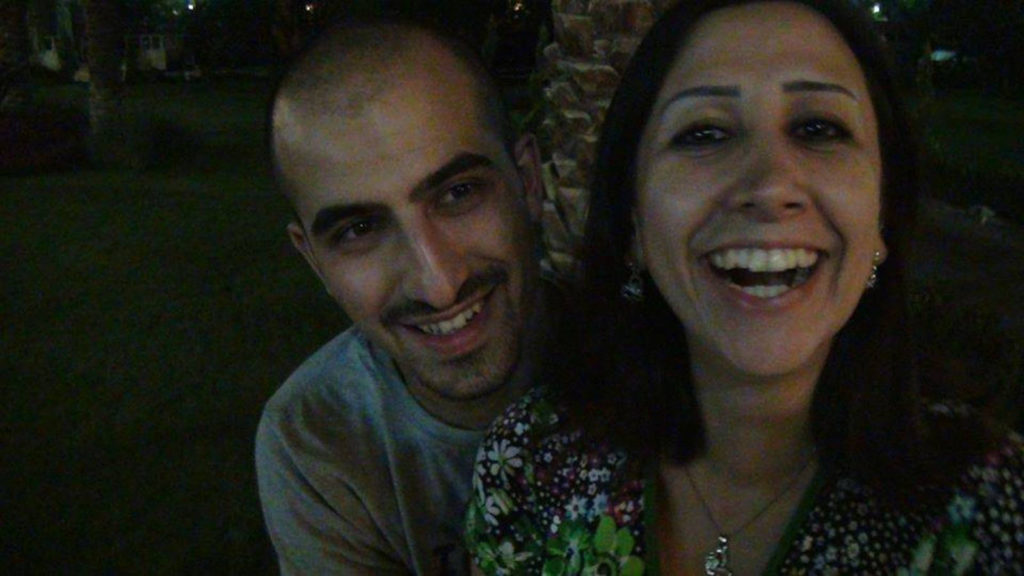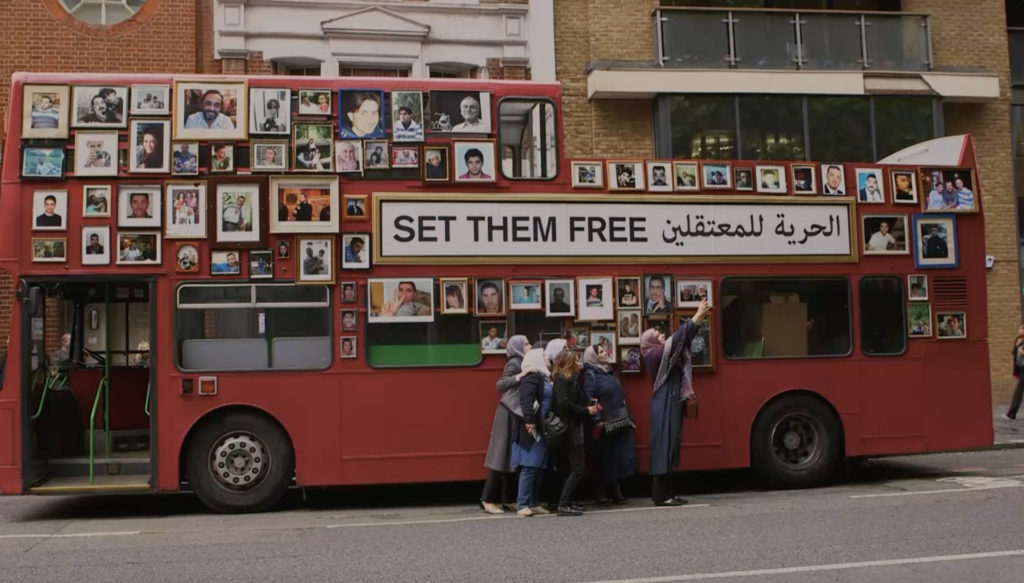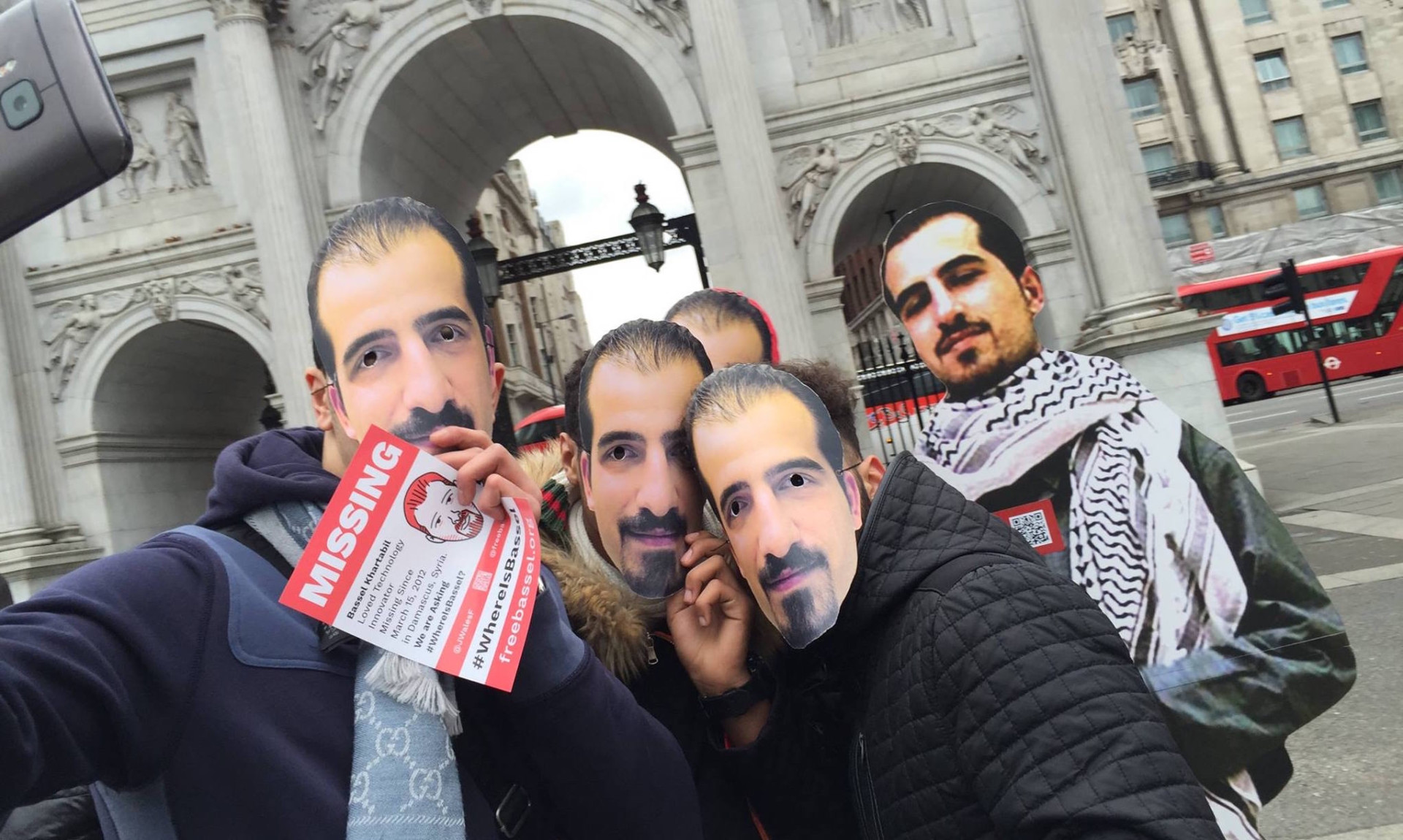The greatest challenge I’ve faced as a filmmaker is how to depict absence – how to show someone who isn’t there.
I started making a documentary with a man who was then disappeared. The voice of someone so present, loud, and provocative, was suddenly silent. Why did this happen? What did it mean? What trace did he leave behind? And was there any way for me to answer these questions on film?
In May 2013 I was in Place Vendome, Paris. A taxi pulled up and Father Paolo Dall’Oglio, a Jesuit priest, hurriedly asked me in. We were running late for his live radio interview to publicize his new book, “A Priest in the Syrian Revolution.” His relentless advocacy work for Syria meant I had to squeeze in time with him whenever and wherever I could.
I’d known Father Paolo for almost two decades, and I’d made several films with him. Originally from Rome, he lived in Syria for 30 years and had set up a unique interdenominational Christian community of monks and nuns who focused on interfaith dialogue, particularly between Muslims and Christians. Open for visitors from all walks of life, of any faith and none, the community was a place where people would visit, picnic, talk, and experience a monastic and communal life.
Now, in 2013, in the Monte Carlo Radio studio, he was angry. Angry about the Assad regime’s violence and atrocities against its own citizens but also the failure of the international community to stop it and support the democratic protest movement. He warned of further bloodshed and implored his listeners, “It is not enough for people to say, ‘good luck.’ It is your moral human duty to come and save us.” Paolo was his feisty old self. Good, I thought. I will make a film about a priest in the Syrian revolution. That was my plan.
Father Paolo spoke fluent Arabic with a distinctly Syrian accent. His outspokenness led to his expulsion from Syria in 2012. After that, he worked tirelessly advocating for Syria and took his ideas of dialogue to another level. He even set up a TV talk show on Orient TV, an opposition channel, bringing together Syrians to discuss topics like the role of the media, sectarianism, violence, and the effects of bombs. Paolo told me: “The TV work is for me a way to fight! To participate! To be there! I do hope it will work.” He could not stay silent.
A couple of months after Paris, I saw Father Paolo in a video of a nighttime protest run by the student union in Raqqah, in northern Syria. It was July 28, 2013, and they were chanting against the regime. Father Paolo was introduced as “a priest for all Syrians.” When he said, “I hope that Raqqah becomes the first capital of liberated Syria, in anticipation of the fall of Damascus in the near future,” it was met with rapturous applause.
Father Paolo had smuggled himself into the city in northern Syria, which had recently liberated itself from regime forces, yet it was under threat from the rise of ISIS, which had not yet established it as their capital. Members of ISIS had kidnapped French journalists, and Paolo decided to do what he could to try to negotiate their release. On July 29, Father Paolo went to an arranged meeting and never came back. He, too, was kidnapped and there were many rumors: he had been killed, kept as a prisoner, exchanged. Seven years later there is still no reliable information about his fate. He was forcibly disappeared.
When it happened, I felt confused, angry, frustrated, and sad. I didn’t know what to do. Do I keep filming? Will there be a chance to negotiate for his release? Could it endanger him or anyone else if I continued filming? What did it mean for the causes that he had cared so passionately about now that he was out of the picture?
This was a very painful time for Paolo’s family and loved ones, who also didn’t know what to do – should they speak out, or stay silent? It was a delicate time, and no one had an answer.

As time went on, these questions remained. I met more people whose loved ones had been forcibly disappeared in Syria. This led me to Iraqi Kurdistan, Jordan, Lebanon, Turkey, and across Europe. It became quickly clear how large this issue was. In 2020, there are at least 100,000 people who have been forcibly disappeared in Syria, and the numbers continue to grow. The Syrian regime, whose frequent use of arbitrary detention and torture has been well documented, is responsible for the huge majority of forced disappearances. Non-state armed groups such as ISIS have committed this crime too, forcibly disappearing at least 8,300 people.
The legal definition of forced disappearance is when a person is last seen in the custody of state forces (or non-state armed groups) who will not admit they have detained the person or reveal where they are being held. The majority of those at risk tend to be human rights defenders, relatives of those disappeared, witnesses, and lawyers. As the activist Shohini Shaudhuri puts it, “As a political crime, it may be understood as the art of making people disappear imperceptibly and effacing the evidence.”
Forced disappearances were a hallmark of most conflicts during the 20th century and a regular tactic of authoritarian regimes. Under Spanish dictator Francisco Franco’s rule, 100,000 people were forcibly disappeared; in Bosnia, 8,000 were disappeared during the war in the ‘90s; during the Sri Lankan civil war, up to 100,000 disappeared; 30,000 disappeared in Argentina during military rule; 17,000 disappeared during the Lebanese civil war. In rare cases, the disappeared re-appear after years in detention. In others, where there is political will and the means, their remains are eventually unearthed and identified. Yet in too many cases, the fates of the disappeared remain unknown.
This is a tactic to spread terror and to erase histories and experiences. In an article about forcible disappearance in Syria, Nadim Houry from Human Rights Watch quotes a Syrian regime defector as saying: “Detaining someone limits their ability to act, but disappearing them paralyzes the entire family. The family will divert all their energies to finding them. As a tool for control, it can hardly be beaten.” It is a crime that affects societies, communities, and families for generations. It reverberates. There is an absence that remains present. And every one of these disappearances is an individual story. It was knowing such individuals personally that compelled me to make “Ayouni.”
I had hard drives and tapes full of material I filmed with Father Paolo from the early 2000s to 2010, and from that last trip in Paris. This material of Paolo, in his own voice, acquired a new meaning and a new value. These were memories and traces of someone that refused to be erased. They called out to be told and to be shown in the present tense. I could have made a film “about Paolo.” But it was after I met his sister Machi that I realized it was through others that I could understand his present absence. It was the longer story, how this absence takes shape over years, which really tells us something about both the individual and the crime they were victims of.
For the one-year anniversary of his disappearance, Machi invited me to Rome to film a video appeal to Father Paolo’s captors. What struck me was not only how hard and distressing this situation was – even I was nervous filming – but also how tender. The warmth she felt when she spoke about Paolo, and when she and her younger brother joked about what they would do to him when he comes out because they had to film a video appeal to unknown captors. “I’ll beat him up!’ said his little brother.
This small, fleeting moment revealed so much. Though he was not physically with us, we all felt Paolo there somehow, even though he was taken away from us. In October 2020 –six years after I filmed that moment – I was presenting the film to a live audience in Florence, Italy, with Machi. She said something unexpected about the film: Our hearts need to keep feeling the pain and anger. And people new to these stories need to feel the pain of others, she said, because “as time moves on, this pain subsides and there is a danger when that happens that we begin to forget.” These stories might go into an oblivion.
Seven years is an age. Our lives move on; Machi’s life has moved on. If Father Paolo does return, he will be a different person – this could be from the violence he has experienced, or the isolation. But there is also the danger that we not only forget the individual stories, the individual pain and anger, but also the collective political narratives that the forcibly disappeared and their families have experienced.Disappeared Even in Death
These themes of forgetting and remembering, anger and sadness, individual and collective, I also heard from Noura Ghazi Safadi, whose story I also followed over several years as she fought for answers about her forcibly disappeared husband.
“I am so angry with him!” said Noura tenderly when she saw the finished version of “Ayouni.” It was the first time she had seen footage of her husband, Bassel Safadi, in which BBC journalist Jane Corbin asks about his safety, to which he replies, “I’m pretty safe.” He was being filmed discussing video evidence and material he helped smuggle out of areas under siege, particularly from Daraa in 2011. He mentioned that five people in his network had been killed and that “it is safer to carry a gun than a camera in Syria.”

Less than a year later, and on the eve of his wedding, he was detained by Syrian government forces. He was disappeared for eight months then moved to the Adra civilian prison, where Noura could meet with him. They decided to get married there and became known as “the bride and the groom of the Syrian revolution.” Noura gave me access to her and Bassel’s personal archives, which showed intimate moments of their relationship, fleeting moments of them together. The most moving for me was a conversation she and Bassel had with their friend sitting in a garden. They spoke about the fear they felt for their relationship, but also the hope they had for the future of Syria. Their wide-eyed reactions carried the weight of the unknown future.
Bassel was detained in prison for three years from 2012, and Noura managed to visit him regularly. Then in October 2015, she got a panicked phone call. He said a patrol had told him to pack his things and they were about to take him away and he didn’t know where. That was the last time she heard from him. Two years later, following a relentless search for information, Noura finally received news via the Russian military in Syria that Bassel had been executed a few days after that call. But she still hasn’t received confirmed information of how he was killed, when, and what happened to his corpse. The state’s bureaucracy tells her scant information. Bassel, even in death, is still forcibly disappeared.
I had met Bassel in 2010 in Syria. He was an open-source developer who set up Syria’s first hack labs, Aikilab and Creative Commons Syria, and worked with the likes of Wikipedia and Mozilla. His technical know-how and international connections meant he was a great go-between.
Unlike Paolo, the public figure, Bassel worked quietly, behind the scenes. In their different ways, both Paolo and Bassel supported freedom of expression, freedom of conscience, and freedom of the media. They both exposed the regime’s atrocities and insisted on a peaceful revolution.
Noura was as involved with the revolution as Bassel and Paolo. She is a human rights lawyer and a dedicated advocate for political prisoners in Syria, particularly those detained and forcibly disappeared. In her own way, as a lawyer, she is also carrying on the spirit of the work of both Bassel and Paolo, all these people who contributed to what they hoped would become a better civic society. Noura also understands the individual and the collective. As I filmed her, I saw how she has taken her struggles and used them to relentlessly advocate on these issues. She was one of the founders of the Syrian women-led movement Families for Freedom, which advocates for Syria’s detained and forcibly disappeared and which famously turned a London bus into a memorial. She also set up NoPhotoZone, a collective of non-violent activists, to support their families and raise awareness of the forcibly disappeared.
Paolo and Bassel are just two of the at least 100,000 forcibly disappeared in Syria. The Syrian regime still stands, though crippled by years of conflict, economic failure, and recently the pandemic. In this context, what does such silencing mean for the future of Syria? How will justice and accountability be found?
The starting points for this film were the stories of Paolo and Bassel, two people I had known in Syria. When I started making this film I did not know where it would lead. I was filming and researching at the same time. I met a lot of people. I decided to include Noura and Machi in the film because I realized that we cannot only understand forced disappearance through its immediate victims; we must also view it from the perspectives of the victims’ networks and families.
When I started making “Ayouni,” I didn’t know the film would end up being not just about accountability, justice, and disappearance, but most importantly about love – love for Syria, for justice, for your siblings, for your lover, and for the future – and the hope that families hold onto. This film has become an important memory-document for both families, a place for Noura and Machi to remember and share their experiences and memories with others, an opportunity to feel their pain and love, and an opportunity to relive some moments with Paolo and Bassel.
“Ayouni” means “my eyes” in Arabic, but it is also a term of endearment, meaning “my love.” Forced disappearance is the opposite of love. It’s a tactic that aims to break families apart, to silence the disappeared and those close to them, to erase narratives that don’t fit with the dominant power structure. As a filmmaker, I found out that film does have a role. Film can fight the oblivion that forced disappearance aims for by keeping people visible and in our sights.




